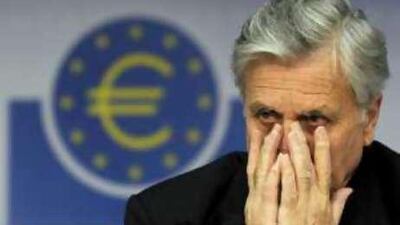Europe's central bank raised interest rates yesterday to tackle rising inflation as oil rose to a new record, US markets entered bear territory and analysts warned of an approaching global storm. The European Central Bank's (ECB) attack on inflationary pressures will also further dampen growth as the industrialised world heads towards "stagflation". The outlook of stagnating growth and inflation - a throwback to the recession of the 1970s - was underlined as oil prices rose above US$146 (Dh536) a barrel, and the Dow Jones Industrial Average, a key measure of US economic health, declined to 20 per cent below its recent peak, putting it into bear-market territory after a six-month slide.
"Crude has a knife in our back and it keeps twisting," said Marc Pado, a US market strategist and technical analyst at Cantor Fitzgerald in San Francisco. Analysts said the Gulf, although protected to some extent by rising oil revenues, was not immune from the storm gathering across the global economy. The gloom was palpable yesterday as, along with the US decline, Japanese stocks hit a 50-year low, and the FTSEurofirst 300 Index dropped 1.5 per cent, hitting a level not seen since July 2005. MSCI's main world equity index fell 0.7 per cent to its lowest since Jan 23, breaching the low set during the height of the Bear Stearns crisis in March.
The (ECB) raised interest rates by one-quarter of a per cent to 4.25 per cent, making it the first G7 central bank to do so since the credit crunch exploded last August. Raising interest rates curtails growth in the supply of money in an economy, which is thought to curb inflation in the price of goods and services. The move is part of a delicate balancing act by central bankers, who are split between encouraging growth and combating inflation.
Faced with immediate pressures to increase rates to tackle rising prices, higher borrowing costs will also slow economies that are already showing signs of recession. The US is teetering on zero growth, and a raft of countries in Western Europe are expected to contract in the next few months. As if to signal the end of the longest period of economic growth in recent history, one of America's industrial icons, General Motors, faces the possibility of bankruptcy, according to a leading investment bank report. The car maker's shares tumbled to their lowest point since 1954, after a Merrill Lynch analyst said bankruptcy was "not impossible if the market continues to deteriorate".
"This has been a summer of thunderstorms that have been building up for some time," said Justin Urquhart Stewart, an investment director at Seven Investment Management in London. "Only now are people beginning to realise quite how dark this particular storm is looking, but it's been a long time coming." Oil exporting GCC countries such as the UAE and Saudi Arabia benefit from high oil prices, insulating them in part from global market turmoil. But GCC economies are also grappling with the inflation that those high prices have brought, coupled with rising food prices and global wage growth that threatens to increase the cost of construction and economic development.
Inflation in all Gulf nations, except Bahrain, stands in the double digits. Qatar's was 14.75 per cent in the first quarter of this year, the highest in the region. Inflation in the UAE is estimated to have been 11.1 per cent last year. Inflation has had wide-ranging effects, from increases in government spending on fuel subsidies to the postponement of a single GCC currency, originally planned for 2010.
But while the UAE and other Gulf nations are somewhat protected from the turmoil in developed markets in the West, there is growing concern that they, too, may suffer if the global economy enters a period of stagflation - declining growth coupled with surging inflation. "We're not immune, but we are very well insulated, at least for now, from the difficulties affecting other parts of the globe," said Simon Williams, the chief economist for Gulf markets at HSBC. "The value of our currency is being drawn down because of weakness of the dollar, and we are suffering from inflation because of rising global commodity prices, and because of monetary policy ties to the US."
All GCC currencies, except Kuwait's, are pegged to the US dollar, which has stoked inflation as the US Federal Reserve has lowered interest rates in recent months. But the greatest long-term danger for GCC economies, Mr Williams said, was if the current crisis in the US and Western Europe fed through into Asian markets and translated into a slowdown in the demand for oil. Even then, though, oil revenues would remain high.
"We're not isolated, but we are certainly well insulated from the troubles affecting the outside world," Mr Williams said. Fahd Iqbal, the vice president of research in Dubai at the Egyptian bank, EFG-Hermes, said the GCC was "relatively sheltered" from the crisis in the West. At the same time, though, turmoil could lead to more difficulty for GCC companies and nations in raising capital on international markets, he said.
But perhaps the most pronounced effect could be on the UAE's stock markets. "The stock markets are not entirely immune," Mr Iqbal said. "There is substantial sentiment-related risk." @Email:afitch@thenational.ae

